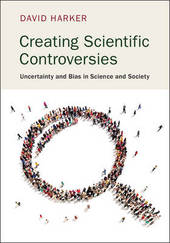
|
Creating Scientific Controversies: Uncertainty and Bias in Science and Society
Hardback
Main Details
| Title |
Creating Scientific Controversies: Uncertainty and Bias in Science and Society
|
| Authors and Contributors |
By (author) David Harker
|
| Physical Properties |
| Format:Hardback | | Pages:266 | | Dimensions(mm): Height 253,Width 180 |
|
| Category/Genre | Philosophy of science
Impact of science and technology on society |
|---|
| ISBN/Barcode |
9781107069619
|
| Classifications | Dewey:501 |
|---|
| Audience | | Tertiary Education (US: College) | | Professional & Vocational | |
|---|
| Illustrations |
6 Tables, black and white; 3 Halftones, unspecified; 10 Line drawings, unspecified
|
|
Publishing Details |
| Publisher |
Cambridge University Press
|
| Imprint |
Cambridge University Press
|
| Publication Date |
1 October 2015 |
| Publication Country |
United Kingdom
|
Description
For decades, cigarette companies helped to promote the impression that there was no scientific consensus concerning the safety of their product. The appearance of controversy, however, was misleading, designed to confuse the public and to protect industry interests. Created scientific controversies emerge when expert communities are in broad agreement but the public perception is one of profound scientific uncertainty and doubt. In the first book-length analysis of the concept of a created scientific controversy, David Harker explores issues including climate change, Creation science, the anti-vaccine movement and genetically modified crops. Drawing on work in cognitive psychology, social epistemology, critical thinking and philosophy of science, he shows readers how to better understand, evaluate, and respond to the appearance of scientific controversy. His book will be a valuable resource for students of philosophy of science, environmental and health sciences, and social and natural sciences.
Author Biography
David Harker is Associate Professor of Philosophy at East Tennessee State University. He has published articles in journals including British Journal for the Philosophy of Science, Philosophical Studies and Studies in History and Philosophy of Science.
Reviews'Harker has produced a valuable book that introduces students to important insights from the philosophy of science and cognitive psychology in order to prepare them for grappling with major debates at the intersection of science and society.' Kevin Elliott, Michigan State University 'This is a stimulating and engaging book that introduces some of the core issues in the philosophy of science by taking the reader through a variety of important scientific controversies. By means of this novel approach it offers a useful resource to not only philosophers of science and their students but also anyone concerned about rational decision making and critical thinking in general, including the scientifically literate public and scientists themselves.' Steven French, University of Leeds 'This is a unique and important book that addresses a topic of pressing social and political importance with great care and clarity, and an excellent understanding of the relevant science. This is applied philosophy of science at its best.' James Ladyman, University of Bristol 'This book has the look and feel of a classroom text, complete with topics for discussion at the end of each chapter. ... Harker spends a good deal of time providing background on the history of the philosophy of science, elementary logic, and the literature on cognitive bias. Each of these topics in and of themselves is useful. Indeed, Harker's explanation of the problem of underdetermination of theory by evidence was extremely well done. The explanation of the literature on cognitive bias was also a nice compendium of diverse research findings.' Lee McIntyre, Metascience
|